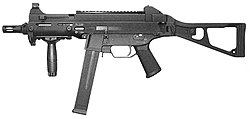Top Qs
Timeline
Chat
Perspective
List of modern equipment of the Brazilian Army
From Wikipedia, the free encyclopedia
Remove ads
List of equipment in service with the Brazilian Army.

Infantry equipment
Summarize
Perspective
The Army's arsenal of firearms (individual and collective) was estimated at 299,300 weapons in 2010: 52,100 pistols, 500 revolvers, 9,100 submachine guns, 89,000 bolt-action rifles, 143,300 automatic rifles and 5,300 medium machine guns. 1,800 heavy machine guns, 800 81-millimeter mortars and 400 60-millimeter mortars were counted separately as light weapons.[1] The International Institute for Strategic Studies (IISS) estimated 1,436 81 mm mortars in 2024 and included them in its calculation of total artillery strength.[2]
This armamament and communications and personal protection equipment are in replacement, since 2016, by new standards defined by the Combatente Brasileiro (COBRA) project. The former service rifle, the FAL and its variants, is giving way to Imbel's IA2.[3] Total service rifle demand to phase out the FAL family has been reported in the press as in the 140 thousand[4] or 200 thousand range.[5]
Individual protective equipment includes aramid helmets[6] and bulletproof vests with no standard supplier or material. The latter must have a level III protection in NIJ standards.[7] 2009 technical standards specified an outer covering in polyamide fabric, but did not determine a material for other components.[8] Camouflage follows a lizard-style pattern, inspired on the French TAP47 and the Portuguese 1960s pattern. It consists of wide dark brown and dark green strokes on a lighter background.[6]
Pistols
Submachine guns
Rifles
Shotguns
Machine guns
Sniper rifles
Grenade launchers
Recoilless weapons
Anti-tank guided missiles
Light and medium mortars
Helmets
Night vision and thermography
Remove ads
Armor
Summarize
Perspective
By IISS estimates, the Brazilian Army fielded over 2,250 armored fighting vehicles in 2023, the highest number in Latin America, although modern models were a minority of this total. This number includes 292 main battle tanks and 1,466 armored personnel carriers.[2] In the Army's terminology, formations equipped with tracked vehicles are "armored" units, while those with wheeled vehicles are "mechanized".[44]
Tanks
Tank destroyers
Armored cars
Personnel carriers
Recovery vehicles
Engineering vehicles
Remove ads
Artillery
Summarize
Perspective
The IISS calculated a total of 2,263 artillery pieces in Army service in 2024, including 109 self-propelled howitzers and 412 towed howitzers.[2] Self-propelled field artillery groups service armored brigades, while towed artillery is part of other brigades. Missile and rocket launchers are concentrated in the Army Artillery Command in Formosa, Goiás.[64]
Missile and rocket artillery
Self-propelled howitzers
Towed howitzers
Heavy mortars
Air defense
Having deactivated its towed antiaircraft guns in 2023, the Army's sole air defense platforms are self-propelled antiaircraft guns and man-portable missiles,[71] both operated by the artillery arm.[64] All available systems are restricted to defense against low altitude targets.[72]
Self-propelled guns
MANPADS
Mobile surveillance radars
Remove ads
Unarmored vehicles
Summarize
Perspective
Unarmored vehicles in Army service are classified by category (administrative or operational) and usage (transport, tractor, trailer, semi-trailer and special). Administrative vehicles perform routine activities, confidential missions and logistical support in exercises and military operations. Operational vehicles have direct tactical or logistical roles in exercises and operations.[78][79] 8,500 wheeled unarmored vehicles, from fuel tankers to refrigerated trucks, were acquired from 2012 to 2015, equivalent to a renewal of 40% of the inventory, according to General Staff figures.[80]
In the truck sector, the main supplier by around 2015 was MAN's Latin American division, provider of a fleet of over five thousand Volkswagen vehicles.[81] The standard off-road light vehicle in 2019 was Agrale's Marruá.[82] The motorcycle inventory comprised 699 units in 2012: 193 from Harley-Davidson, the largest in service, 307 from Honda and 168 from Yamaha. The remainder was older, from no longer extant brands such as Agrale.[83]
Trucks
Buses
Light vehicles
Motorcycles
Remove ads
Water transport
Summarize
Perspective
Combat engineering units field small boats, crosswalks, rafts and pontoon bridges for river crossings.[102] In the Pantanal[103] and Amazon theaters, where options for ground transport are few, other units resort to river transport. Manaus, Amazonas, headquarters a peculiar logistical unit, the Amazon Military Command's Boat Center (Portuguese: Centro de Embarcações do Comando Militar da Amazônia, CECMA).[104]
Motorboats
Catamarans
Ferries
Tugboats
Ferry boats
River crossings
Remove ads
Aircraft
Brazilian Army Aviation in its current format, created in 1986, has no fixed-wing aircraft and flies rotary-wing aircraft (helicopters)[118] and unmanned aerial vehicles.[119] The helicopters, 95 in total in 2023,[120] are grouped in two categories, maneuver and reconnaissance and attack.[121] There is no dedicated attack helicopter.[122] A bid to acquire Short C-23 Sherpa transport planes, which would resurrect fixed-wing aviation in the Army, peaked with a June 2020 presidential decree authorizing the operation of this type of aircraft. This decree was soon revoked after heavy criticism from Brazilian Air Force officers.[118]
Remove ads
See also
Notes
- Assembled in Italy and completed with electronics, controls and military equipment in Iveco's factory in Sete Lagoas.[56]
References
Wikiwand - on
Seamless Wikipedia browsing. On steroids.
Remove ads






























































































